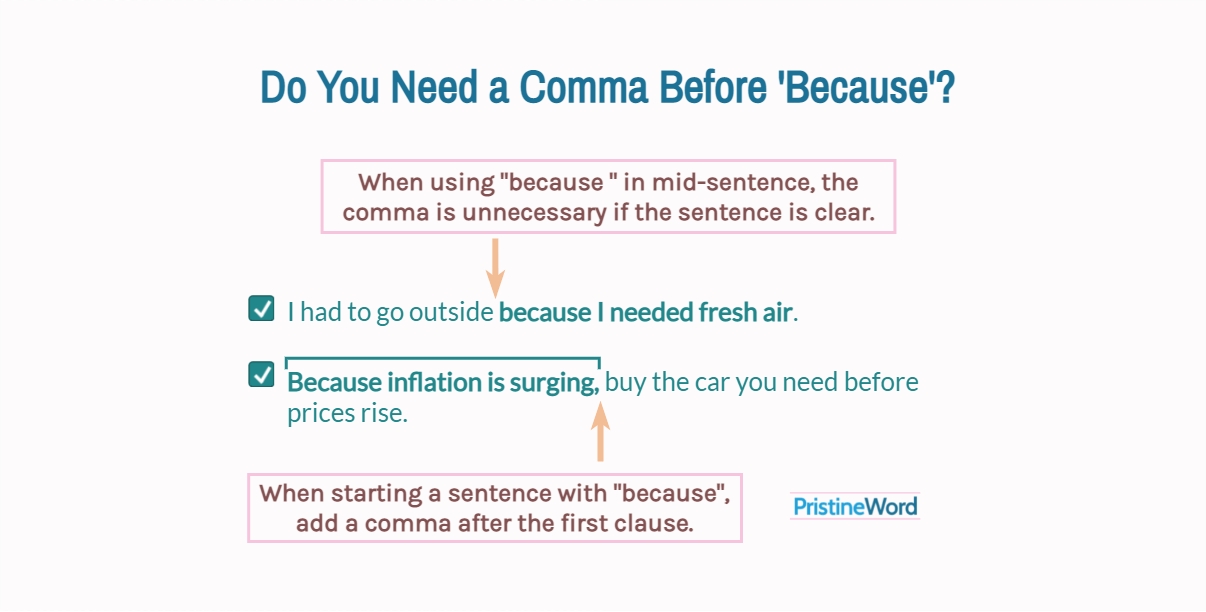You should not add a comma before "because" in English if the meaning of the sentence is clear (not ambiguous).
When using "because" in mid-sentence, the comma is unnecessary if the meaning of the sentence is clear (not ambiguous).
Mary went to Chicago because her mother was sick.
If "because" comes at the beginning of a sentence, add a comma after the first clause (introduced by "because").
Because her mother was sick, Mary went to Chicago.
Because her mother was sick Mary went to Chicago.
Contents
1. 'Because' in Mid-Sentence
We do not typically use a comma before "because" in mid-sentence. Why?
A clause is a part of a sentence that contains a subject and a verb. For example:
John went to the restaurant because he was hungry.
This sentence has two clauses:
- "John went to the restaurant" is the independent clause. It is the main part of the sentence; it expresses a complete thought and can stand alone.
- "Because he was hungry" is the dependent clause. It is added to the independent clause and cannot stand alone as a sentence.
As a subordinating conjunction, "because" joins an independent clause ("John went to the restaurant" in the example above) and a dependent clause ("because he was hungry"). Placing a comma between an independent clause and a dependent clause is not grammatically correct in English.(1)
My sister went to Spain because she loves Spanish food.
My sister went to Spain, because she loves Spanish food.
Be also aware that if both clauses have the same subject, you should repeat the subject after because.
More examples
- I study English because I want to work in the United States.
- I came back because I had forgotten my sunglasses.
- Green tea is good for your health because it is high in antioxidant polyphenols.
- My wife is planning to go to Africa because she wants to climb Kilimanjaro and embark on a safari tour.
- I had to go outside because I needed fresh air.
2. Use a Comma to Clarify
There is an exception, however, to this practice of not using a comma before "because". Occasionally, a negative sentence with because can have two possible meanings. Only in this case, use a comma to clarify.
Examine this sentence:
Mary didn't go to Chicago because her mother was sick.
Without further contextual information, it is not clear whether:
- Mary didn't go to Chicago (because she had to stay with her sick mother); or
- Mary actually went to Chicago, but for a complete different reason.
To clarify that Mary didn't go to Chicago, insert a comma before because:
Mary didn't go to Chicago, because her mother was sick.
Omit a comma before because if you mean the opposite. For example:
Rebecca didn't buy the T-shirt because it was cheap; she bought it because its style looked good on her.
Rebecca didn't buy the T-shirt, because it was cheap; she bought it because its style looked good on her.
The second version is incorrect because she actually bought the T-shirt.
More examples
- My brother didn't go to the party, because he had to deal with too much work.
- I didn't invest in gold, because it seemed too expensive.
- She couldn't write the essay, because her computer suddenly stopped working.
The following negative sentences should not include a comma before "because":
- My brother didn't go to the dentist because he was experiencing tooth pain. He went because he was having persistent bad breath.
- Olivia is not reading the book because it is interesting; she is reading it because she was bored.
- John does not exercise because he wants to lose weight; he does it to improve his health.
3. Starting a Sentence With 'Because'
It is common and perfectly acceptable for "because" to start a sentence, as in:
Because it was raining, we canceled the barbecue.
As mentioned above, we do not commonly put a comma in front of "because" in mid-sentence. However, when starting a sentence with a dependent clause (e.g., starting a sentence with "because"), add a comma after the first clause.(1)
Because you are too irritated, slow down and focus on your breathing.
Because you are too irritated slow down and focus on your breathing.
More examples
- Because it is November, the temperature is getting cooler.
- Because everything seemed so confusing, I didn't know what to say.
- Because he wanted to feel healthier and save money, my uncle quit smoking.
- Because I was feeling down, I had to go outside.
- Because inflation is surging, buy the car you need before prices rise.
4. Conclusion
These guidelines will help you decide whether to use commas with because in a sentence:
- Do not put a comma before "because" if your sentence is clear (there is no ambiguity).
- Consider adding a comma before "because" to clarify a negative sentence with two possible meanings.
- Remember to place a comma after the first clause of a sentence starting with "because".
5. References
(1) Kaufman, Lester; Straus, Jane. The Blue Book of Grammar and Punctuation. Chapter 2 (punctuation).

